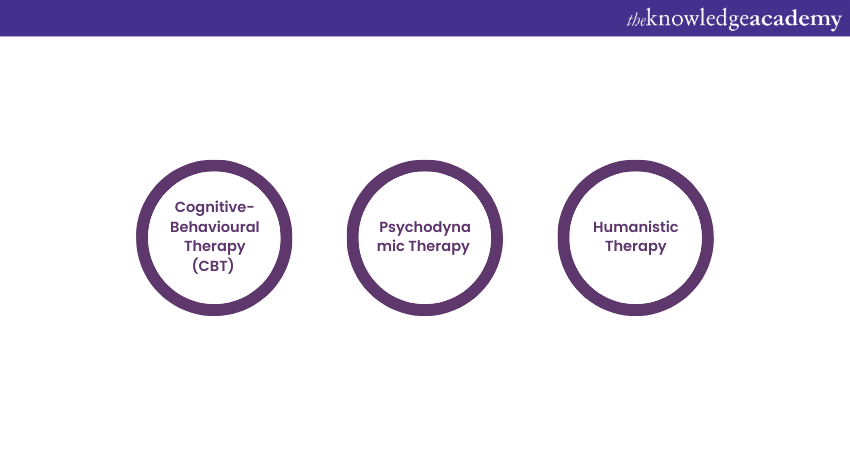We may not have the course you’re looking for. If you enquire or give us a call on 01344203999 and speak to our training experts, we may still be able to help with your training requirements.
Training Outcomes Within Your Budget!
We ensure quality, budget-alignment, and timely delivery by our expert instructors.

Counselling Psychology is a profoundly impactful and specialised branch of applied Psychology. It primarily focuses on enhancing mental well-being and emotional resilience. Its importance lies in providing individuals with invaluable support and guidance to overcome emotional, social, and psychological challenges. It is essential to understand What is Counselling Psychology?
According to the NHS, more than 1.71 million people in the UK were in contact with mental health services. Counselling Psychologists empower clients to navigate life's complexities through different therapeutic interventions, promoting personal growth and a positive mindset. Read this blog to discover the significance of Counseling Psychology, explore its various approaches, and grasp the role of Counseling Psychologists in our informative blog.
Table of Contents
1) What is Counselling Psychology?
2) The importance of Counselling Psychology
3) What do Counselling Psychologists do?
4) Life as a Counselling Psychologist
5) Different approaches in Counselling Psychology
6) Conclusion
What is Counselling Psychology?
Counselling Psychology is a specialised field of Applied Psychology that provides professional assistance to individuals dealing with emotional, psychological, and social challenges. Such Psychologists help clients gain insights into their thoughts, feelings, and behaviours through a collaborative and empathetic approach.
Additionally, they aim to foster personal growth, resilience, and overall well-being by utilising various therapeutic techniques and evidence-based practices. This branch of Psychology emphasises creating a supportive and confidential environment where clients can freely express themselves and work towards finding solutions to their problems.
Counselling Psychology is instrumental in empowering individuals to lead fulfilling and emotionally balanced lives. Moreover, the psychological research and theoretical principles involved at put into direct practice while working with people and various organisations.
Furthermore, the Scientist-Practitioner model and its reflective philosophies are incorporated in the profession and the therapeutic relationship between the practitioner and their client is perceived as a vehicle utilised for powerful change.
The Psychologists involved implement a phenomenological approach to their practice on a regular basis, which means that they deal with research aspects such as exploration and enquiry to better comprehend an individual’s distinct subjective psychological experience. Their understanding of this experience parameter helps them empower their recovery journey and alleviate periods of distress.
Moreover, Counselling Psychology is defined by the British Psychological Society (BPS), as a field which comprises of professionals who are relatively new to the industry. These very professionals are considered to be practicing at the integration of psychological theory and research with therapeutic practice.
Now it is important to also note that the practice of Counselling Psychology demands high levels of self-awareness coupled with strong competency skills in being able to relate the skills and knowledge of both personal and interpersonal dynamics to the therapeutic context.
The Importance of Counselling Psychology
Counselling Psychology is extremely important today as it addresses Mental Health and emotional well-being. It provides a safe and confidential space for individuals to explore and understand their thoughts, emotions, and behaviours. Counselling Psychologists offer professional guidance and support to help people cope with life's challenges, such as stress, anxiety, and relationship issues.
They equip individuals with effective coping strategies and problem-solving skills through various therapeutic approaches. Counselling Psychology also plays a vital role in breaking down mental health stigma, encouraging people to seek help and support when needed. It contributes significantly to fostering a healthier and more resilient society.
Learn to find acceptance and respect with our Counselling Masterclass course!
What do Counselling Psychologists do?
A Counselling Psychologist works in direct contact with people, teams and various organisations. One of the most vital roles involved in is to offer quality therapy to individuals affected by a broad range of complexities or difficulties in their Mental Health. They also work to alleviate their emotional struggles and hardships encountered in relationships.
Additionally, a Counselling Psychologist is highly trained in the skills of assessing an individual’s mental distress levels, taking into account a wide range of factors that are contributing to the maintenance of their suffering. A Counselling Psychologist works directly and actively with such clients in therapy sessions to help them identify the root causes behind their moments of distress.
Furthermore, a Counselling Psychologist is especially equipped with the skills to change an affected individual’s negative or, unhelpful or discomforting patterns. They are capable of applying their understanding of human behaviour and distress to various teams and groups. This helps them to highlight for the individuals where the changes can be made in the context of improvement.
Moreover, Counselling Psychologists also actively engage with their clients in sessions involving teaching, before which they devote their time to extensive research and audit work. This is followed by offering supervision to their trainee psychologists or, interns or apprentices, as well as other Mental Health professionals or team members and leading and managing services.
Life as a Counselling Psychologist
A Counselling Psychologist is trained to consider various facets of human interaction and their individual living experiences. These experiences include their thinking perspectives, how they relate to one another, how they behave towards each other, their experiences in the world and how they are able to function in their daily lives.
Additionally, Counselling Psychologist utilises both Psychological and Psychotherapeutic approaches in their theory and research. They devote time and effort to ensure that they successfully reduce Psychological distress in their clients and to consecutively improve their well-being. This well-being pertains to not just them but also their interpersonal groups and families.
Now, the relationship between a Counselling Psychologist and their client or the patient pivots on the understanding of their individual Psychological difficulties and how they can leverage their self-improvement process with it.
More importantly, they are trained to work with individuals such as children, young people and adults of various age groups at both an organisational and community level. They may also work with multi-professional teams that include doctors, nurses, and other allied Mental Health professionals, along with a wide range of other Psychological professionals.
Furthermore, a Counselling Psychologist would contribute to the design and implementation of Mental Health services for their patients when they are in a management or leadership role. For instance, a Counselling Psychologist could work within the NHS as a licensed professional in the following subdomains:
A) Mental Health services
B) GP surgeries
C) Hospitals
D) Various other health settings
Now, Counselling Psychologists could also work in other domains such as academia, social justice work, advocacy or even research in their area of expertise. They are typically provided with ongoing supervision to help them engage in self-reflection to seek and respond constructively to feedback. This form of supervision helps them develop their professional knowledge and skills.
Counselling Psychologists play a pivotal role in Mental Health and well-being. They are dedicated professionals who support and guide individuals facing emotional and Psychological challenges. Their primary role is to create a safe and confidential space where clients can freely express their thoughts and emotions.
They actively listen, show empathy, and establish a strong therapeutic alliance with their clients. Counselling Psychologists utilise their expertise in various therapeutic approaches to help clients explore and understand their feelings, thoughts, and behaviours. Personalised interventions and evidence-based practices empower individuals to develop coping strategies, foster personal growth, and achieve emotional resilience.
Counselling Psychologists are crucial in addressing Mental Health challenges and breaking down the stigma surrounding seeking help. Professional support and guidance empower individuals to improve their emotional well-being and overall quality of life.
Different Approaches in Counselling Psychology

Counselling Psychology embraces various therapeutic approaches to cater to the diverse needs of individuals seeking support. These approaches are rooted in evidence-based practices and have effectively addressed Psychological challenges. Some prominent approaches include:
Cognitive-Behavioral Therapy (CBT)
CBT is a widely utilised approach that focuses on the connection between thoughts, emotions, and behaviours. Individuals can reframe their perceptions and develop healthier behavioural responses by identifying and challenging negative thought patterns. CBT empowers clients to break free from unhelpful thinking patterns and cultivate positive coping strategies.
Now many research studies suggest that the practice of CBT results in a considerable amount of improvement in an individual’s functioning in daily life. Their quality also improves with each day. CBT has demonstrated itself to be as or more effective than other forms of Psychological therapy or medications approved by Psychiatric professionals.
Professionals and aspirants in this field must note that advances in the field of CBT are made on the foundation and basis of practice in both research and clinical aspects. CBT is basically an approach utilised when there is sufficient scientific evidence that the techniques that have been devised are known to produce substantial change. This is where CBT is distinguishable from other methods of Psychological treatment.
Psychodynamic Therapy
Psychodynamic Therapy explores the unconscious mind to explore unresolved conflicts and past experiences that influence present behaviours and emotions. By gaining insight into these underlying factors, clients can work towards resolving internal conflicts and fostering personal growth.
Humanistic Therapy
Humanistic Therapy emphasises self-awareness, personal growth, and individual potential. Therapists create a supportive and empathetic environment where clients can explore their true selves and values. Humanistic Therapy encourages clients to take responsibility for their choices and make positive life changes. It is a study in Psychology that believes in the good of people and focuses on helping them reach their best by exploring their distinct features. It essentially helps them develop to their optimum through the path of self-actualisation.
Interested in Psychology? Try our Introduction to Psychology of Personality Course!
Conclusion
We hope you enjoyed reading this blog on What is Counselling Psychology, its types, and how it promotes mental well-being and empowers individuals to navigate life's challenges. Through a diverse range of therapeutic approaches and compassionate support, Counselling Psychologists help clients develop coping skills, gain self-awareness, and foster personal growth. Embracing it can lead to a more fulfilling and emotionally balanced life.
Understand mental disorders and their effect on people with Psychology Masterclass Course!
Frequently Asked Questions
Upcoming Health & Safety Resources Batches & Dates
Date
 Mental Health and Wellbeing Training
Mental Health and Wellbeing Training
Fri 5th Jul 2024
Fri 20th Sep 2024







 Top Rated Course
Top Rated Course



 If you wish to make any changes to your course, please
If you wish to make any changes to your course, please


